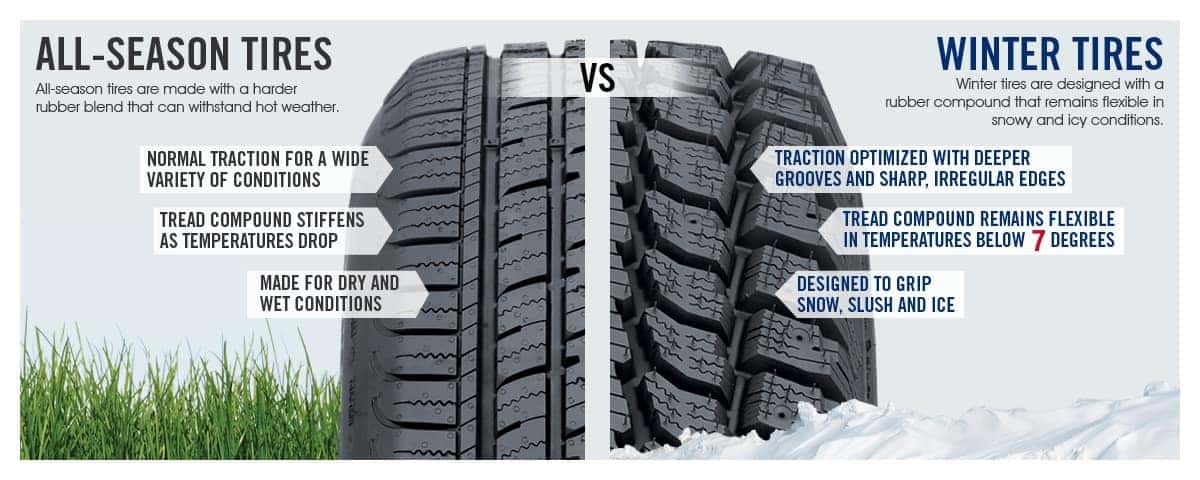
Winter Tires are fitted for November-April exact dates vary by country region then Winter Tires are rotated for Summer Tires when Old Man Winter checks out. We also claim that the winter tires help a car turn better and stop shorter than all-season rubber a fact backed up by many formal tests published by respected magazines.

Dedicated winter tires are always a good idea for maximum safety but most winter travel restricted roads will allow travel without winter tires if you have chains and your all-season tires are in good condition and are appropriately marked.
Winter tires vs all season. With advances in all-season tires and mild winters in some areas it is a fair question to ask. Consumer Reports tests consistently show that wintersnow tires deliver better grip to start in snow. All-season tires are designed to operate in a wide temperature band but not at the extremes in either direction.
What Are Winter Tires. Winter tires are made from special rubber compounds that are. Although all-season tires offer traction in a variety of different weather conditions winter tires surpass them when it comes to traction in snow and ice.
The tread life for all-season tires is usually longer than tires that are designed for a particular season. All-season tires can have low rolling resistance which sometimes saves energy and results in better gas mileage. Are often more comfortable and quieter.
The all-season tires shave asymmetric tread for performance with a dry grip and. Most winter tires the new term for snow tires outperform all-season tires in snow rain and even on ice. They have a more aggressive tread pattern and are made from a softer rubber compound.
The softer compound allows the tread to squash around the snow compact it and then toss it out as the tire rotates. Snow-rated all-terrain tires certainly do a better job than summer tires of remaining pliable in cold temperatures but the pliability of winter tires in freezing temperatures is on another level. In conclusion snow-rated all-terrain tires are definitely a positive step but drivers shouldnt confuse these tires with true winter tires.
Swap to winter tires around Thanksgiving and back to all-season or summer tires around Easterwinter tires softer rubber compounds wear quickly in warmer temperatures. Store off-season tires in a. Summer tires winter tires or all-season tires.
Usually marketed as performance tires summer tires work best in warmer weather read. When the thermometer dips below 45 degrees you really should consider throwing a set of winter. Winter tires feature big blocky treads which move water and slush more efficiently and softer rubber that maintains flexibility in cold temperatures.
In hot temperatures that softness becomes a liability which is why you need to swap out winter tires for all-season or all-weather once spring is sprung. Winter Tires are fitted for November-April exact dates vary by country region then Winter Tires are rotated for Summer Tires when Old Man Winter checks out. Not very long ago some of the tire manufacturers set about developing tires that could be used year-round in Europe including through the winter months and thus the All-Weather Tire was born.
The winter tires cost less than all-season tires and the cars other tires rest when the snows are on. We also claim that the winter tires help a car turn better and stop shorter than all-season rubber a fact backed up by many formal tests published by respected magazines. However all-wheel drive is very tempting.
All-season tire technology offers great year-round performance for drivers who live in moderate climates and do not frequently encounter extreme cold ice and snow in the winter months. Winter Snow Tires are Engineered for True Winter Conditions When it comes to driving in winter weather having the right tire matters. Winter Snow Tires 0225.
Winter Snow Tires Share on Facebook Share on Twitter Share on Pinterest Email Page to a Friend. Many of todays vehicles leave the factory with all-season tires. While all-season tires are intended to provide traction in a wide variety of weather conditions weve found they can behave like a Jack-of-all-trades master of none.
When deciding whether you need a tire for winter or all-season conditions keep these two key considerations in mind. All-season tires can be used all year round and work well in mild winter conditions but do not have the same winter-specific features as winter tires so their performance in harsh winter weather is not as good. All-weather vs All-season vs Winter Tires - Kal Tire All-weather tires are Canadas year round tire while 3-season tires formerly called All-season tires are perfect for spring summer and fall.
For serious winter driving you guessed it winter tires are the way to go. Dedicated winter tires are always a good idea for maximum safety but most winter travel restricted roads will allow travel without winter tires if you have chains and your all-season tires are in good condition and are appropriately marked. All-season tires are known for being able to handle most seasons relatively well but lacking the same level of traction compared to summer tires or winter tires in their respective seasons.
An all-weather tire gains grip during the winter time by using rubber compounds similar to winter tires. Even if your vehicle has four-wheel drive or all-wheel drive its your tires that provide the real traction. The more tire traction these systems have to wo.
Motormouth Canada had a chance to travel to Whitehorse in the Yukon to test two identical cars one with winter tires and one without. Even with a vehicle e.